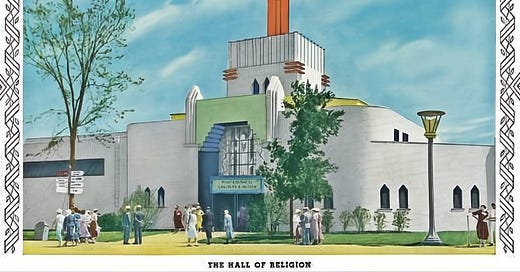The academics for whom Machen wrote might have expected him to pander to them and concede various points of emphasis and doctrine for the sake of the social and political good. They would be disappointed. Whether Machen assumed that many in his audience were 1) Christians, or 2) familiar with contemporary church issues did not seem to concern him. He charged ahead:
At the present time, the Christian Church stands in the midst of another conflict. Like the previous conflicts, it is a conflict not between two forms of the Christian religion but between the Christian religion on the one hand and an alien religion on the other. Yet —again like the previous conflicts—it is carried on within the Church. The non-Christian forces have made use of Christian terminology and have sought to dominate the organization of the Church.
Machen remained a churchman and maintained a church-first perspective. He had no ultimate answer to any person’s or society’s ills besides Christian truth and the hope of the Gospel. For him, an attack on Gospel truth was an attack on humanity.
This modern attack upon the Christian religion has assumed many different forms, but everywhere it is essentially the same. Sometimes it is frankly naturalistic, denying the historicity of the basic miracles, such as the resurrection of Jesus Christ. At other times it assails the necessity rather than the truth of the Christian message; but, strictly speaking, to assail the necessity of the message is to assail its truth, since the universal necessity of the message is at the center of the message itself. Often the attack uses the shibboleths of a complete pragmatist skepticism. Christianity, it declares, is a life and not a doctrine; and doctrine is the expression, in the thought-forms of each generation, of Christian experience. One doctrine may express Christian experience in this generation; a contradictory doctrine may express it equally well in a generation to come. That means, of course, not merely that this or that truth is being attacked, but that truth itself is being attacked. The very possibility of our attaining to truth, as distinguished from mere usefulness, is denied.
Earlier, he had decried materialistic utilitarianism; now, he abominates pragmatist skepticism. The church cannot be a social services delivery organization; the Gospel cannot be a conflict resolution method or a sort of technology to enhance human flourishing. The liberals’ de-supernaturalization project was not just dead wrong doctrinally—their teaching was deadly in a spiritual sense.
This pragmatist skepticism, this optimistic religion of a self-sufficient humanity, has been substituted today, to a very considerable extent, in most of the Protestant communions, for the redemptive religion hitherto known as Christianity—that redemptive religion with its doctrines of the awful transcendence of God, the hopelessness of a mankind lost in sin, and the mysterious grace of God in the mighty redemptive acts of the coming and death and resurrection of Jesus Christ. Many of the rank and file of the churches, many of the individual congregations, are genuinely Christian; but the central organizations of the churches have in many cases gradually discontinued their propagation of the Christian religion and have become agencies for the propagation of a vague type of religion to which Christianity from its very beginning was diametrically opposed.
Machen seemed to spin out devastating paragraphs like this with ease. It’s all there: “the awful transcendence of God” (which includes his Creatorship, his sovereignty, his law, his covenants, and his holiness), the total depravity of man, and the person and work of Christ—all truths delivered to the world by the ministry of the Spirit-empowered church.
There’s an old novelty country song that drawls, “You’re not the kind of woman I wanted, but you’re the kind of woman I got.” Machen’s message to the political and social scientists was almost certainly NOT what they wanted, but Machen knew these academics were not special and needed to hear the truth...and that’s what they got. He knew that many, many of those who made up the societies and polities they studied were “still hopeless under the load of sin” and that all—the scientists and the subjects— would have to stand before the transcendent, holy God.
Read The Responsibility of the Church in Our New Age in full.
Listen to a fine reading of the article (39 minutes) by Bob Tarullo.
Stay tuned for future installments - by Brad Isbell
READ PART 8




